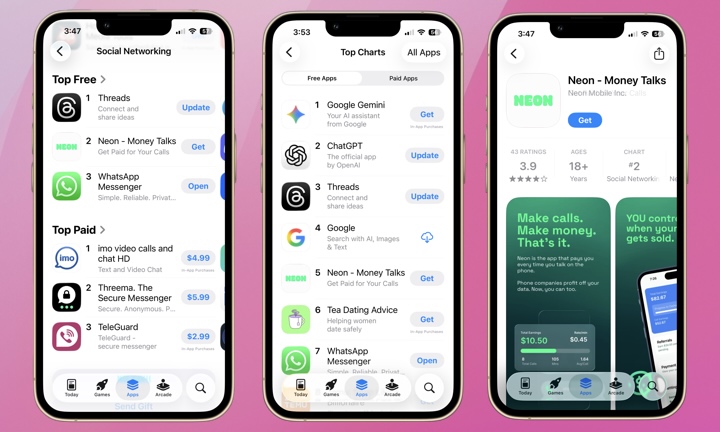This App Records and Sells Your Calls — And It’s a Top App Store Hit

Toggle Dark Mode
Hold the phone. You read it right the first time. Neon, an app that records your phone calls and sells the recordings to companies training AI, is currently the second-highest-ranked free social networking app on Apple’s App Store. It’s also the fifth-ranked free app overall. This is even strange to type.
Neon pays users 30 cents per minute when calls are made to other Neon users and 15 cents per minute to non-Neon users, up to a maximum of $30 per day. Users can cash out with a minimum of only 10 cents earned. Payments are typically processed within 3 business days.
According to Neon, only the Neon user’s voice is recorded during calls with a non-user. If both participants are Neon users, they’ll record both sides as long as one person starts the call through the Neon app. If you’re a Neon user and receive a call from another Neon user who initiates the call from the app, you’ll be recorded regardless of whether or not you’ve set up call forwarding.
Neon claims its technology emphasizes privacy by filtering out names, numbers, and “other personal details,” and only “anonymized audio” is recorded. This data is then sold to AI companies to “help train their systems to understand diverse, real-world speech.” Recordings are encrypted and “only sold to vetted companies.” According to Neon, you should trust them because “Most companies sell your data without telling you, and they definitely don’t cut you in.”
Let’s dig into that last claim from the perspective of other telecom companies. Your cellular carrier cannot legally sell your actual recorded conversations. It’s explicitly prohibited by federal law under Consumer Proprietary Network Information regulations (CPNI) and the Telecommunications Act of 1996, both enforced by the Federal Communications Commission. The FCC also maintains strict compliance requirements for CPNI, like annual certification from telecommunications companies, data breach notification standards, and more.
What they can and do sell are called call detail records, or CDRs. This information includes metadata like when calls were made, for how long, location data, and even what numbers were dialed. Otherwise, telecom companies, like Verizon, can’t provide audio content to anyone aside from law enforcement with a valid court order or warrant. Data collection policies can vary across carriers, as may your ability to opt out of some or all data collection.
While some websites you visit may or may not collect, share, and sell your data in accordance with their privacy policies, with little oversight except in the most egregious cases. However, your phone call data is governed by much more stringent laws. Some of us may believe that embracing new technologies in a much more connected world includes letting go of our personal privacy. However, there are still laws in place to protect consumer rights. As always, we encourage our readers to learn and understand privacy rights so you can make educated decisions when it comes to your personal data and using new apps and services. As for us? We’ll pass on Neon.








